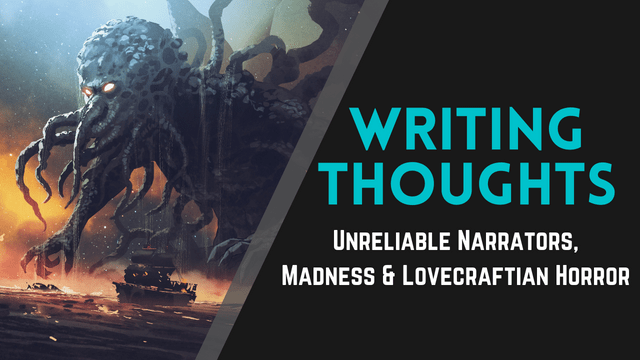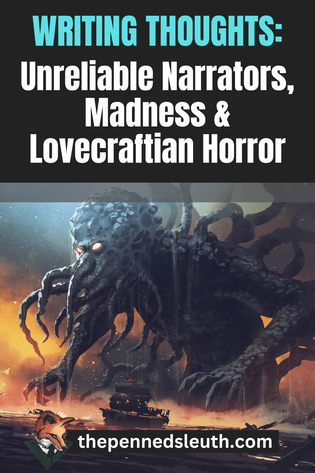Latest Writing Video! |
|
Like with most interests, we are typically drawn to them by the works of others. Whether it’s a genre of film, a style of painting, or a genre of literature. In this Writing Thoughts post, I am going to share my thoughts on the writing technique of unreliable narrators and how it is used in Lovecraftian horror. Let’s dive right in! Pin for Later!The TopicNow, unreliable narrators are a pretty self-explanatory writing technique. The character that is narrating the story is an unreliable source of information. They are either lying about certain points for their own advantage, they were intoxicated at certain points, they struggle with a mental problem, or they were tricked into believing a version of reality that someone wanted them to believe. It’s a brilliant story-telling method that leaves the reader second-guessing facts if it is established that their perspective is flawed. If that isn’t established, then it does a great job of leading the reader down a different passage of thought, making it easy to surprise them with a plot twist, a shocking fact that contradicts something they learned before. As you can guess, this is a technique that isn’t used only in your average cosmic horror. Such a closed perspective is often used for mystery novels in order to keep important facts away from the reader. A mystery plot without any mystery is just a long epilogue. Yet, Lovecraft’s works, and many others who try to create their own Lovecraftian horror, use unreliable narrators to evoke horror. The character telling the story is typically drunk, or drugged, or mad. The story they tell is unbelievable, atmospheric, and frightening. The world often feels surreal as the characters delve into dark ancient ruins or encounter monstrous individuals. Are these the effects of their vice or is it a scary reality? Sometimes, you never know! My ThoughtsThose of you who have read or listened to some of my earlier work on my website and my YouTube channel know that the works of H.P. Lovecraft were a big inspiration for my writing. When I was growing up, there were 3 authors I enjoyed reading and he was one of them; the other two being Edgar Allan Poe and Sir Arthur Conan Doyle. I still have heavy tomes of their work on my bookshelf to this day, although I haven’t browsed through their stories for quite some time. That being said, I wanted to specifically talk about unreliable narrators in Lovecraft's works and what I found so brilliant and captivating about them. First of all, as writers, we often explore the emotions and psyche of different characters in our stories. We convey their anger, their grief, their joy, and so on. We write a variety of emotions in order to make a reaction feel realistic, as there are ups and downs on every journey. As for their mentality, we convey their focus, their confusion, and their anxiety at the right moments. The one mentality that fascinates me in stories is madness. When I say ‘madness’, I am referring to the madness that comes when one loses a sense of reality. There are many types of madness in literature, from characters being driven mad by their love for someone, or driven mad by their rage and frustration, or driven mad because they find their lives so mundane. The ‘madness’ that Lovecraft conveys is one where the character’s mind is broken by the horror they witness. Yet, as with unreliable narrators, you are not sure if their vice is what has driven them mad, or if it is what keeps them sane when encountering such madness. There are so many layers that unreliable narrators add to a story, but this is the one I found most interesting because it is up to the author to convey this madness in a way that isn’t annoying. A lot of authors paint madness as a torrent of scary questions, and then say it frightens the character and has them act ridiculously. I’m not saying that is a bad way to convey madness, but it isn’t the most enjoyable way of doing it. I’ve also written enough stories to know that it is not easy to write either. An unreliable narrator is tough to manage, but in Lovecraftian horror, it can be impossible if not thoroughly thought through. How does one write something so unclear with such clarity? One of the methods I consider to be important to these kinds of stories is the language they use. The old English way of telling a story, the almost Shakespearian-drama levels that are employed do a fantastic job of making such a narrative interesting. The reason I believe this works is because of Wuthering Heights by Emily Bronte. The madness that Heathcliff embodies, although very different from the madness displayed in some of Lovecraft's works, is made compelling by the way the story is written. The similarities that I found between the two authors are simply the age difference between their writing and modern-day writing. Plain, straightforward writing does not suit reality-breaking madness at all. There needs to be a certain flair to the writing. Another example of madness I enjoyed reading was the madness of Don Quixote by Miguel de Cervantes. Again, it was a different language, altered by the translation from Spanish to English, but the translation’s style certainly shows age compared to modern-day writing. Now, for clarity's sake, I am not saying that these three authors had very similar styles, I’m just saying they are different from today’s styles. The way each conveyed their different madnesses was unique to their stories, but their efficacy in doing so is unquestionable. If you want to read some examples of H.P. Lovecraft’s unreliable-narration-filled stories, then I recommend “The Whisperer in Darkness”, “The Call of Cthulhu”, “The Shadow over Innsmouth” and “The Dreams in the Witch House”. Although, it might be better to get a full collection of Lovecraft’s works as most are short stories or novellas. I found a complete collection ebook on Amazon for less than a dollar and if you are interested in the cosmic horror genre, it will be the best less-than-a-dollar you’ve ever spent. ConclusionI believe that if you want to write a great Lovecraftian horror, layered with the complexity of an unreliable narrator, then the most effective way to convey the madness of the character is to use an older writing style, at least when describing the surreal moments. I think that dramatic flair is necessary to convey the thoughts and emotions of the characters effectively and engagingly.
Of course, that is just my opinion. I would also like to hear your thoughts on the subject. Do you think the writing style matters? Do you even like the unreliable narrator technique? Let me know in the comments below! As always, Good day, goodnight, and happy writing!
0 Comments
Leave a Reply. |







